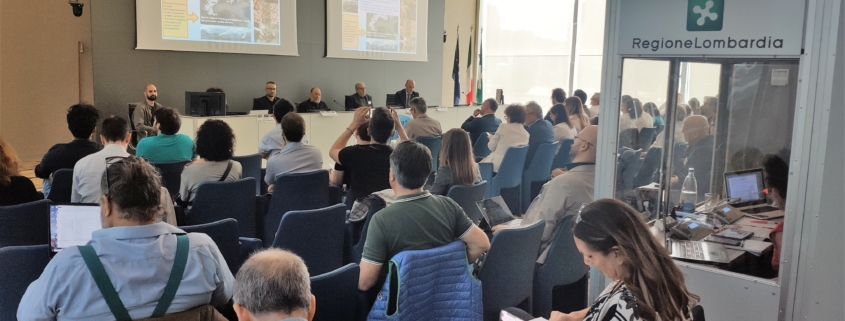Biomass Conference: 30 million already disbursed by the Po Valley regions to replace obsolete biomass devices
During the final conference of the ‘Biomass’ pillar of the LIFE PrepAIR project, held on June 1st in Milan at the end of seven years of work, several conclusions emerged related to the results produced by the project, on the management of policies to reduce emissions from woody biomass heating systems.
Indeed, biomass combustion for domestic heating is responsible for 57% of primary emissions of fine particulate matter, PM10, and 65% of ultra-fine particulate matter, PM 2.5 (source: Life PrepAir 2019 database), most of which comes from plants installed more than 10 years ago (source: AIEL Statistical Report 2022).
The four regions of the Po Valley that are subject to European air quality infringements (‘Piemonte, Lombardia, Veneto, Emilia-Romagna’) have been working together on these issues for almost 20 years, which is unique at the European level, as Gian Luca Gurrieri of the Lombardy Region pointed out. Together, the regions set a key agenda: the request to the Italian government to renew the Turin protocol – which was signed in June 2019 – with actions of national competence on biomass, to support and complement regional policies (which have already been activated over the years and will of course continue).
The significance of the several calls for tenders that the different territories of the Po basin that are partners in the project have launched in recent years to boost the replacement of biomass plants was then emphasised; initiatives that are intended to be repeated in the near future to support technological renovation and the spread of the most advanced and therefore less polluting devices.
In fact, the five Po Valley regions (the four already mentioned, with the addition of Friuli-Venezia Giulia) have in recent years promoted the replacement of obsolete plants with new biomass plants, thanks to special calls for tenders. Overall, from the opening of the calls for tenders up until May 23, approximately 8,000 applications were submitted and funds worth over thirty million euros were allocated.
This theme was followed by discussions on several open issues.
Regarding the registration of biomass plants, it was stressed that the process would be greatly facilitated by extending the acknowledgement of the professional profile of the chimney sweeper, who could also have the task of registering plants during the annual chimney cleaning operations. Regarding the profile of this operator, the extension of this recognition (currently regulated only by Lombardy and the Province of Trento) could be conveyed by a Position Paper drawn up at the end of the project, with the aim of acting on a regional basis first and then on a national level, also as part of the re-launch of the actions of the Turin Protocol.
With regard to the issue of inspections, it was pointed out that – in relation to a tendency towards a greater future use of woody biomass as a fuel for domestic heating (unfortunately favoured by the trend of natural gas costs) – it is necessary to provide for a strengthening of control and inspection actions, given that the general biomass device stock is in part obsolete and highly polluting. However, the problem of how to facilitate inspections at private homes remains unsolved: a national provision allowing access to homes in order to verify the presence of a biomass system or the quality of wood or pellets would be of great help.
In relation to these issues, it is necessary to envisage an initiative that introduces a regulation on the controls to be carried out on the devices, particularly in the private sector, which identifies and defines the different cases of operations (e.g. alerts, presence of ‘black smoke’), the person(s) who can intervene in these cases, and the procedures for verifying the requirements of the set up, the characteristics and maintenance of the device, the type of fuel used and combustion residues.
It is recommended that, in addition to the communication campaigns of the Project and of each Region, a national communication campaign be implemented to reach the population more effectively and raise awareness on the correct use of this type of devices and the correct way to burn wood.
The LIFE Prepair Project | Katia Raffaelli, Emilia-Romagna Region
Keynote Speech | Gian Luca Gurrieri, Lombardy Region
Communication and public awareness on the correct use of biomass for domestic heating | Luisa Pineri, Lombardy Region
Technical and specialist training for installers and designers of domestic biomass systems. Enhancement of the role of “qualified chimney sweep” for the control and maintenance of biomass domestic systems. | Gabriele Tonidandel, Trento Province
The professional figure of the chimney sweep. | Sandro Bani, Antonio Faggiano, ANFUS
Woods status Report | Paolo Nastasi, ERSAF
Analysis of the logistics of consumption and supply of woody biomass | Antonio Ballarin Denti, Domenico Vito, FLA – Nicola Andrighetto, Università di Padova
Measures fighting the domestic combustion impact on air quality in Austria | Manuel Schwabl, BEST – Bioenergy and Sustainable Technologies GmbH
Climate Positive | Nicola Andrighetto, University of Padova
GreenChainSAW4Life | Lucio Vaira, Walden Srl
BBCleanLIFE (Alpine Space project) | Giacomo Gerosa, University Cattolica del S.C.
The perception of citizens on Air Quality in the Po Valley Area | Marco Ottolenghi, Michele Bartolomei, ART-ER
The current status of the legislative reviews related to domestic heating appliances | Bernardo Martinez, EU Commission
Technological developments for reducing PM and organic carbon in biomass domestic heating-systems | Valter Francescato, AIEL
Development of national legislation and measures | Fabio Romeo, Ministry for Environment




